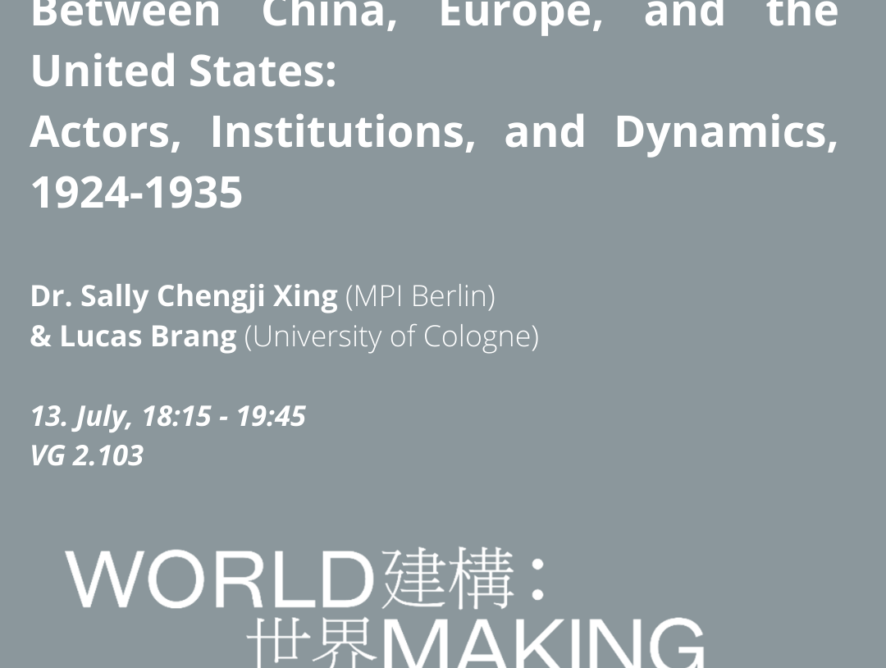
- This event has passed.
Transnational Knowledge Transfers Between China, Europe, and the United States: Actors, Institutions, and Dynamics, 1924-1935
July 2023 @ 18:15 - 19:45
Event Navigation

13. July (Thursday), 18:15 – 19:45
VG 2.103
Overview
The two talks of this joint session interrogate processes of knowledge transfer between China, the United States, and Europe during the 1920s and 1930s. Focusing on two distinct organizations– the China Foundation (based in Shanghai and New York) and the League of Nations (based in Geneva) – both talks shed new light on the transnational entanglements of the Republican period in China, and demonstrate how foreign efforts to influence China often met with domestic resistance.
Abstract First Talk (Sally Chengji Xing): The China Foundation’s Sponsorship for Pure Science Research since 1924
In the first half of the twentieth century, leading American intellectuals frequently communicated with a cohort of prominent Chinese intellectuals previously trained in the US. Such face-to-face interchanges across the Pacific ultimately influenced Chinese choices in shaping modern scientific education and research, and the impact was generated primarily through a unique organization established based on Sino-American intellectual collaborations, the China Foundation. The China Foundation administered the second American remission of the Boxer Indemnity Funds to China and served as a sponsor of Chinese pure science research. Xing’s talk studies the contested debates, conversations and dialogues that occurred in Beijing surrounding the establishment of the China Foundation in 1924. It revisits the robust debate within the China Foundation back in 1924, by Paul Monroe and Roger Sherman Greene, about whether to sponsor “pure” or “applied” science for the sake of China’s modernization. In so doing, it demonstrates how and why Paul Monroe’s ideas, though being very influential at the time, were consequently challenged by Greene and other Chinese scientists.
Abstract Second talk (Lucas Brang): From Geneva with Expertise: The League of Nations’ program of cooperation with Republican China (1925-1935)
Despite being largely forgotten today, the League of Nations’ China Program was likely the largest and most ambitious program of international cooperation and “development assistance” prior to the second half of the twentieth century. From its formal inception in 1931 to its dismantling several years later, the cooperation between Geneva and Nanjing brought large numbers of European experts to China, where they advised on such diverse fields as public health, educational reform, infrastructure-building, administrative restructuring, and global finance. Based on memoirs of involved actors as well as diplomatic documents from several Foreign Offices and the League of Nations Archive in Geneva, Lucas Brang’s talk will reexamine the China Program as an early instance of “global governance” through professional expertise. Revisiting this episode of transnational cooperation demonstrates that, despite the increasingly hostile environment, the early 1930s constituted a highpoint of China’s international legal, economic, and administrative integration. At the same time, internal documents reveal that, rather than being a genuinely universal organization, the League of Nations was widely perceived as an agent of “European civilization” in competition with new hegemons like the United States and Soviet Russia. Finally, the talk shows how this global rivalry over China undermined Geneva’s claim to “neutral” expertise, which ultimately precipitated the collapse of the program along with the interwar peace order at large.
Speakers:
Sally Chengji Xing is a visiting fellow of the Max Planck Institute of History of Science in Berlin (Lise Meitner Research Group, “China in the Global System of Science,” MPIWG) and the Joint Center for Advanced Studies “Worldmaking from Global Perspectives: a Dialogue with China;” she is also an incoming associate professor of US history at Nankai University. She is interested in writing US history from transnational and global perspectives. Her book manuscript in progress, “Pacific Crossings”: The China Foundation and a Negotiated Translation of American Science to China, 1913-1949″, examines how and to what extent did the American intellectuals in the first half of the twentieth century influence the development of Chinese science. Her multi-archival research in China and the United States has been funded by the Society for Historians of American Foreign Relations (SHAFR), the Tokyo Foundation for Policy Research, the Gilder Lehrman Institute of American History, Rockefeller Archive Center, the Consortium for History of Science, Technology, and Medicine and numerous other graduate research fellowships at Columbia University in the City of New York. Her long-term research explores Sino-American intellectual history in transnational approaches, from the early 20th century all the way to the late 1960s.
Lucas Brang is a Ph.D. candidate at the University of Cologne, where he is currently completing his dissertation on the rise of the discipline of international law in early 20th-century China. From 2019 to 2022, he was a recipient of a Marie Curie global research fellowship of the European Union, as part of which he was affiliated with the Chinese University of Hong Kong. Lucas’ research interests include China’s constitutional development and visions of international order from historical and comparative perspectives. In his work, he employs approaches from different disciplinary traditions such as legal theory, conceptual history, and the sociology of knowledge. His research has appeared in journals like Global Constitutionalism, Modern China, and the International Journal of Constitutional Law.
